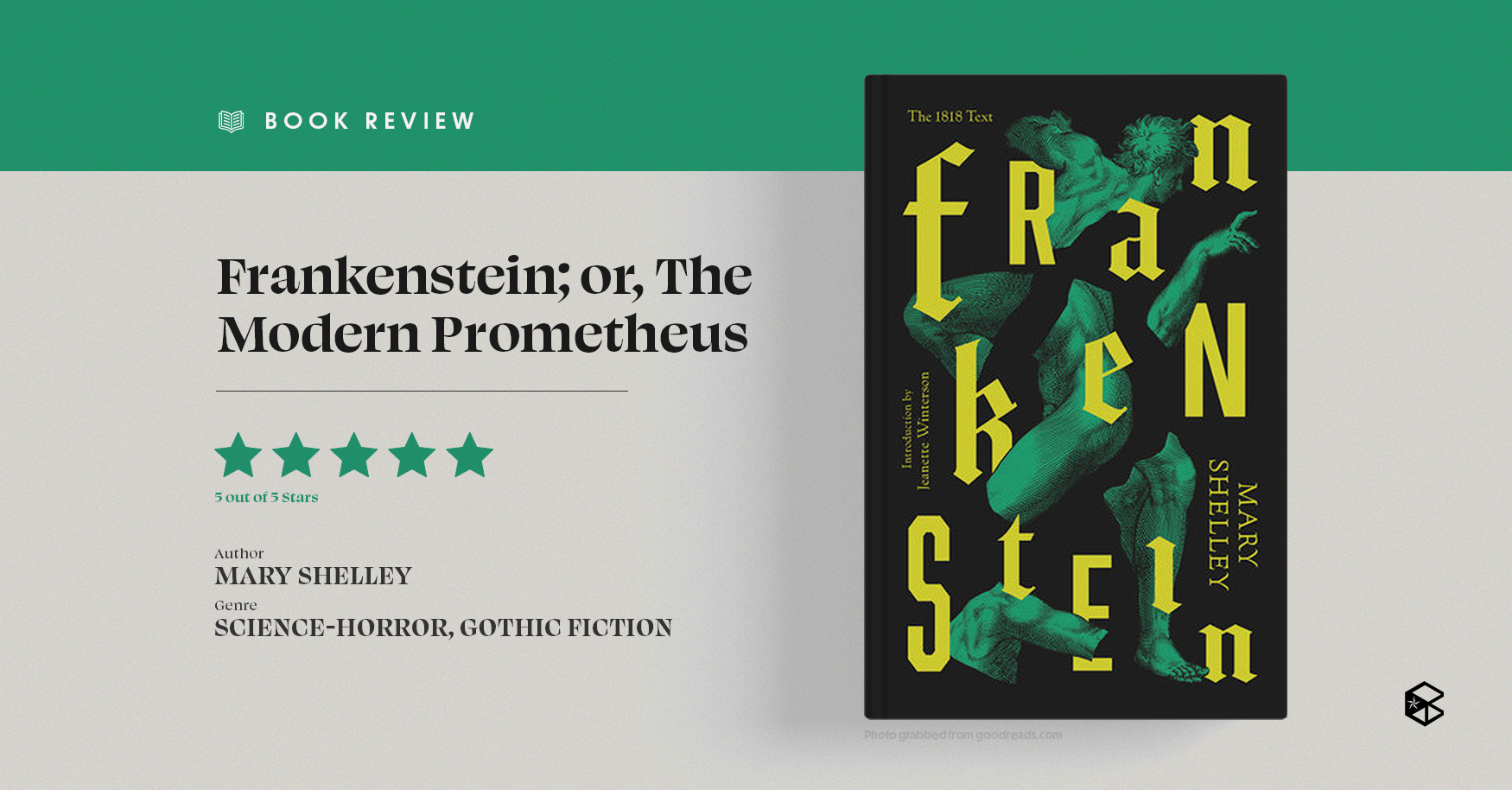Title: Frankenstein; or, The Modern Prometheus
Author: Mary Shelley
Genre: Gothic
Rating: 5/5
This classic novel pulls at the seams of a tangled relationship between a creator and his creation. Here, it explores lives formed by a decaying sense of purpose. “Frankenstein; or, The Modern Prometheus” by Mary Shelley unravels the destructive nature of an uncontrolled ego.
Published in 1818, Frankenstein made a significant contribution to the science-horror fiction genre and remains one of the most influential works in English literature. Evoked from Shelley’s vulnerable experience surrounding conception, it stitched together facets of Gothic literature and the Romantic movement. The story centers on its themes of life, ambition, and how one intends it.
The narrative follows Victor Frankenstein, a modern scientist dedicated to the pursuit of grandiosity. But he is eventually confronted with the consequences of his own arrogance and prejudiced treatment of his creation.
The creator’s folly
Victor disrespected the essence of science through his unorthodox creation of life. Though his profession revolves around understanding nature, he disrupts it through his self-serving experiment of reanimating dead matter. He is blinded by bias against his own creation. His supposed desire to protect his loved ones and humanity reveals itself as selfishness and a refusal to take responsibility. In the end, his actions only put them in greater danger.
The portrayal of the titular character explores themes such as purpose, egoism, and victimhood. These themes were as relevant in the late eighteenth century as they are today. He continually deflects his own negligence, and his fixation on power and recognition becomes detrimental to the well-being of the creature—to the “other.” This spectacle of power still resonates, rendering the creation’s suffering all the more understandable and relatable. Throughout the centuries, his story has been perceived and interpreted in numerous ways, even to the point of debate regarding its and his name. The confusion on whether he’s a mad scientist or a tragic intellectual just goes to show the complexity of his character.
The creature’s being
Humanity rejected the being before he even knew who he was. Ostracized by society, he was lost and alone in the world he was not even meant to inhabit. Eventually, he learned the ways of man, including their emotions such as grudges, anger, and vengeance. In exacting wrath upon his creator, he defined his life by the nature of his conception and what resulted from it.
The creature is more than a monster, but an exploration of life, reaction, and scientific innovation. His experience in a complicated world with an apparent status quo is interpreted in various contexts, such as an oppressed class, racism, colonialism, disability, and more. Its multifaceted depth has allowed it to endure through time, remaining relevant and relatable.
As a pioneering concept that tackles thought-provoking ideas, it has since become a prominent figure in popular culture and media.
The certainty of consequence
Despite being the creator, Victor refuses responsibility and even claims himself a slave. Likewise, the creature, despite being the created, also refuses submission.
Frankenstein; or, The Modern Prometheus explores the consequences of a malicious ego. Victor’s sincere dedication to knowledge is admirable, making his pursuit of excellence understandable. However, that pursuit soon swelled into pride and arrogance, rendering his actions far more corrosive and far-reaching than he ever intended. We can also empathize with the being, an individual unreasonably deemed as vicious and unwelcome for simply existing. Through her deliberate prose, Mary Shelley was able to convey the violent emotions between the creator and his creation, whilst allowing them depth and mercy.
The novel is renowned for the profound themes that can be derived from it. Its genre, for instance, is not exactly horror in the traditional sense but is still able to evoke fear through moral, social, and psychological dimensions. A common point of discussion is also the women present in the story, such as Elizabeth and Justine.
Elizabeth, Victor’s intended bride, has been his primary source of comfort and compassion since childhood. Though she is emotionally important to him, she remains passive, having grown up with the expectation of becoming his wife already shaping herself. On the other hand, the treatment of Justine, his cousin, only further exposes his selfishness, adding more depth to Victor than herself. Other women in the novel are written in a similar manner. Their identities, roles, and relationships to the main characters remain subjects of analysis, reflecting the societal context of the time. Since its publication, countless more interpretations and analyses have emerged from its overarching brilliance, shaping entire genres and influencing contemporary media.
Frankenstein; or, The Modern Prometheus exposes the impact of irresponsibility towards unchecked ambition and how empathy and communication could heal those who are wrongfully rejected.
Frankenstein; or, The Modern Prometheus is available for purchase on Fully Booked, Shopee, and Lazada.


